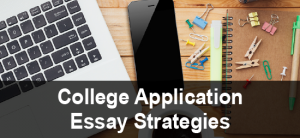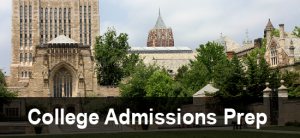So many interviewers kick things off with a question that overwhelms and befuddles even the smartest students.
Are they trying to torture you?
Probably not.
I’ve been on a number of committees that involved conducting interviews, and many of my well-meaning colleagues wanted to start the session by asking this question because they believed it granted the candidate the greatest degree of flexibility and allowed him or her to set the tone of our time together.
Then again, I also have friends who’ve used this question to test, challenge, and weed out certain candidates. If you don’t know how to offer up a coherent response, you’ve blown the first question and turned off the interviewer.
It’s a really simple question. In fact, it’s not even really a question.
So what is it?
“Tell me a little about yourself.”
Here’s what I know goes through a lot of people’s minds when they’re asked to respond to this prompt:
Ummm. So where do I begin? Do you want a brief history of my life up until this point? Are you looking for details about my personal life? Or are you searching for info about my academic interests? Ummm. How can I answer this question? It’s so broad. I don’t even know where to start.
It’s totally normal to feel overwhelmed by this very general prompt.
You’re nervous, and the stakes are high. You want to impress the interviewer and earn a good report. And when you’re anxious, especially right at the beginning of an interview, it’s hard to think clearly and narrow things down on the spot.
MY ADVICE: Avoid starting your interview with this kind of internal doubt!
3 STEPS FOR COMING UP WITH A RESPONSE
STEP #1: Share one or two specific details about yourself that you can describe in about 2-3 minutes. To narrow down your focus, experiment with these fill-in-the-blank sentences.
A. I’m really interested in _______________ because _____________.
Your interest can be related to almost anything—academics, extracurricular activities and hobbies, and/or professional goals. Are you fascinated by math? Are you obsessed with your role on the Model UN team or deeply immersed in baseball training? Do you love hiking or rock climbing? Are you a budding entrepreneur who spends your free time tracking the developments of start-ups? That’s great. Tell your interviewer about what matters to you!
Get as specific as possible.
For instance, if you’re interested in photography, share the aspects of it that you find most exciting. You could talk about how you’re especially fascinated by the process of developing images in traditional dark rooms as well as by turning Instagrams into works of art. Let’s say that you’re also interested in studying literature in college. You could connect your interest in creating images with your study of images in literature. Of course, you also need to explain why you’re interested in these things and be prepared for follow-up questions.
B. Right now, I’m working on this exciting project related to__________.
This fill-in-the-blank sentence is just a variation on the first one, but some of my students have a lot of success with it, so I want to share it with you.
Sometimes students feel as though they have to share something academic or obviously related to college. You don’t. Ultimately, what you want to be doing is helping the interviewer get a feel for you and what makes you tick.
Let me give you an example from my own experience. I earned my Ph.D. in English and specialize in early American literature, philosophy, and religion. However, in graduate school, I also started getting interested in the nondualistic philosophy of Kashmir Shaivism and began studying Sanskrit with a tutor. I included this self-study on my curriculum vitae (the academic version of a résumé). When I was interviewed for a fellowship that focused on helping professors create writing-intensive versions of their classes—a fellowship that had absolutely nothing to do with ancient Indian philosophy or Sanskrit—one of the first questions was, “So, you’ve got to tell us about why you study Sanskrit.” The members of the interviewing committee were intrigued by my interest and by my answer. I got the fellowship. Clearly, that’s not the only reason I was awarded this honor, but it definitely was one of the things that made me stand out from the crowd.
So if you’re working on some sort of independent project—maybe a creative project related to painting, music, or carpentry or perhaps one related to your job or volunteer work—respond by telling the interviewer about it and why it’s captured your interest.
C. I’ve actually been learning a lot about myself through the application process because it’s forced me to sit down and really think about my personal qualities, accomplishments, significant experiences, and goals. It’s really helped me see more clearly that I’m ___________________________.
Obviously, you wouldn’t use this exact wording, but what I like about this approach is that it says something about the deeper significance of the application process. So many people are caught up in the competition and lose sight of the fact that the application has the potential to help you make the intellectual and emotional transitions that are necessary for succeeding once you actually get into college.
D. My friends always say that I’m ______, but (or I agree because) ______.
I like this approach because it shows that you’re aware of how you’re perceived by others and the extent to which you disagree or agree with their ideas. It’s also very easy to come up with anecdotes about why people see you in one way and why you see yourself differently or in the same way.
There are many other ways of responding to interviewers when they ask you to tell them about yourself, so feel free to let my tips get your creative juices flowing.
STEP #2: Once you fill in the blanks (or develop your own focus), come up with vivid and descriptive anecdotes that shed light on these interests or parts of yourself.
(If you’re in the Get Yourself Into College™ program, review Session 13—“Showing and Telling: The Power of Anecdotes”—of Module 3 for in-depth strategies.)
Watch this video, which gives you an example of how you can adapt one of these fill-in-the-blank options to your own situation and develop a compelling anecdote.
Here are some of the things that make the example in the video so engaging and illuminating:
The student shares something important about herself. She admits that she tends to be quieter and more introverted than many of her peers. Another great thing about this strategy is that it immediately lets the interviewer know that she’s probably going to be different from many of the other interviewees. He can understand and value her quieter nature.
She also reveals how her perception of herself has evolved. At first, she thought her introversion was a flaw, but she listened to Susan Cain’s TED talk and came to realize that she can make her own valuable contributions. This approach also lets the interviewer know what the student listens to in her free time. Just FYI: The supplements for some schools (like the one for Columbia University) ask you to “list the publications you read regularly, including print and electronic sources (websites, blogs, podcasts, etc.).”
The student gives the interviewer a sense of what she’s like in the classroom. Although this person is an introvert, she shows how she actively engages in small-group discussions.
She connects these details to why she’s attracted to this particular college, which is known for its small classes, and to the class she sat in on when she visited the campus. Colleges want to know you’re a good fit for them, and this part of her narrative demonstrates that she thrives in this kind of environment and has taken the initiative to visit the school.
Last but not least, the student opens things up by asking the interviewer what his experience was like with the small classes at the college. From my perspective, it’s wise to do your part to turn the interview into a lively discussion. You’ll help avoid the grilling that often takes place during interviews and probably feel a whole lot more comfortable if there’s a more natural conversation.
So in just a few short minutes, the student has managed to let the interviewer behind the scenes into her life and character.
How can you adopt some of these strategies to shape your own response to this “worst interview question?”
STEP #3: Practice by saying your anecdotes out loud. You need to get into the rhythm of talking about yourself in these ways.
WHAT DO YOU THINK?
If you want to share some other strategies for responding to this interview question or have any burning admissions-related questions, post them in the Comments!
Blog post images in order of use: ©g_peshkova/bigstock.com, gemenacom/bigstock.com




